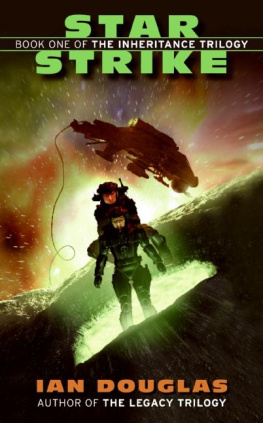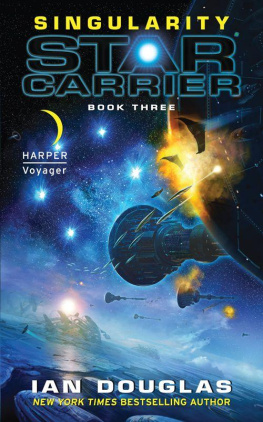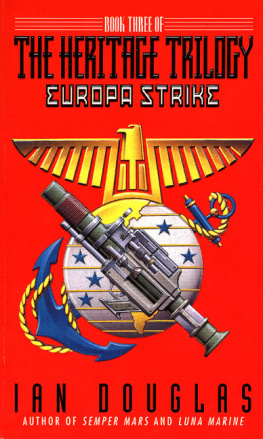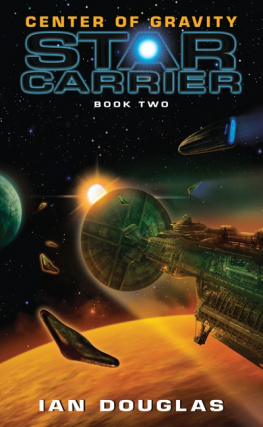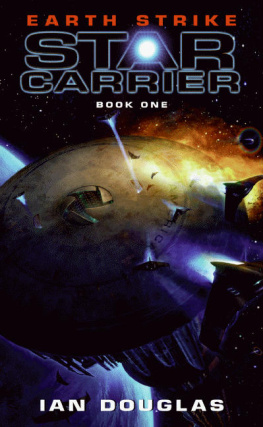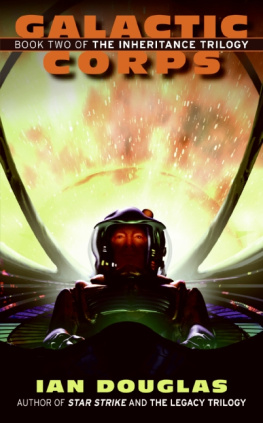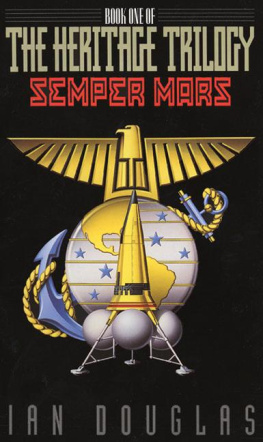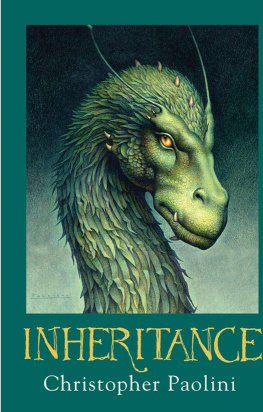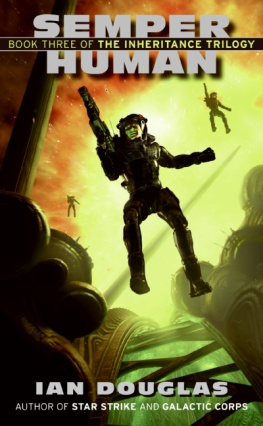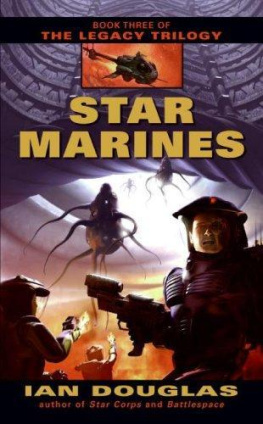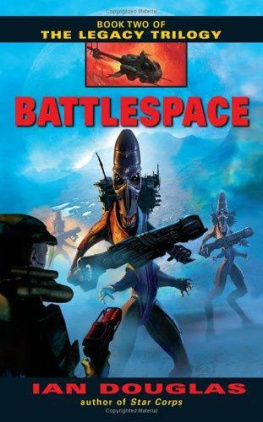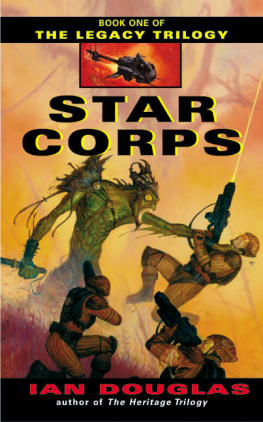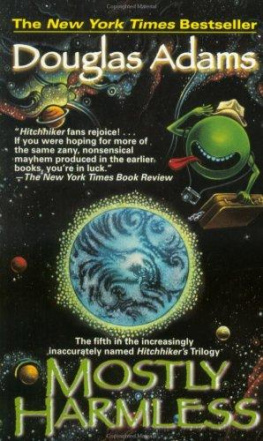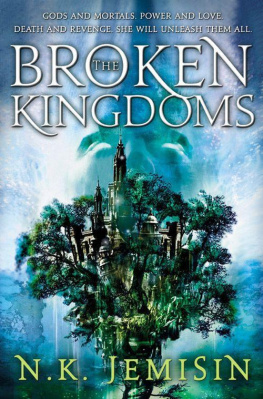Ian Douglas - Star Strike (The Inheritance Trilogy, Book 1)
Here you can read online Ian Douglas - Star Strike (The Inheritance Trilogy, Book 1) full text of the book (entire story) in english for free. Download pdf and epub, get meaning, cover and reviews about this ebook. genre: Detective and thriller. Description of the work, (preface) as well as reviews are available. Best literature library LitArk.com created for fans of good reading and offers a wide selection of genres:
Romance novel
Science fiction
Adventure
Detective
Science
History
Home and family
Prose
Art
Politics
Computer
Non-fiction
Religion
Business
Children
Humor
Choose a favorite category and find really read worthwhile books. Enjoy immersion in the world of imagination, feel the emotions of the characters or learn something new for yourself, make an fascinating discovery.
- Book:Star Strike (The Inheritance Trilogy, Book 1)
- Author:
- Genre:
- Rating:3 / 5
- Favourites:Add to favourites
- Your mark:
- 60
- 1
- 2
- 3
- 4
- 5
Star Strike (The Inheritance Trilogy, Book 1): summary, description and annotation
We offer to read an annotation, description, summary or preface (depends on what the author of the book "Star Strike (The Inheritance Trilogy, Book 1)" wrote himself). If you haven't found the necessary information about the book — write in the comments, we will try to find it.
Star Strike (The Inheritance Trilogy, Book 1) — read online for free the complete book (whole text) full work
Below is the text of the book, divided by pages. System saving the place of the last page read, allows you to conveniently read the book "Star Strike (The Inheritance Trilogy, Book 1)" online for free, without having to search again every time where you left off. Put a bookmark, and you can go to the page where you finished reading at any time.
Font size:
Interval:
Bookmark:
S TAR S TRIKE
B OOK O NE OF THE I NHERITANCE T RILOGY
Ian Douglas
v1.0 (2011.05)
C ONTENTS
Deep within the star clouds of the Second Galactic Spiral
The Specters descended over the Southern Sea, slicing north through
Ramsey kicked off, his 660-ABS armor amplifying his push and
Okay, Marines. How are we going to do this?
Lieutenant General Martin Alexander completed the final download encompassing the
It was, Alexander decided, a bit like being in an
Garroway opened his eyes, blinked, and flexed his hands. This
Lieutenant Tera Lee unlinked from the feed and blinked in
Lieutenant Lee watched the stream of returning data from Chesty,
It was, Alexander thought, a less than auspicious start to
Like Earth, Mars possessed a ring.
The passage from Alighan to Sol took six weeks. For
The transport was two weeks out from Sol. For the
General? Cara said within his mind. I think the AI
So? How does it feel? PFC Sandre Kenyon asked him.
What the hell were you thinking, Marines? Either Lieutenant Kaia
Skybase drifted in empty space, alone and unattended, now, as
PFC Aiden Garroway could scarcely move. He had a little
Garroway had been wondering if any of the SAPs were
The Galaxy is a hellishly big place.
Recon Sword, launch door is open and you are cleared
What the hell is that? General Alexander wanted to know.
General Alexander hadnt gotten much sleep that night.
General Alexander was listening in on the debriefing of the
Emerging from the tube-car transport from his office, General Alexander
The side of the Euler ship cycled open as Garroway
Garroway took careful note of the time1258 hours, nine
Garroway? How you feeling, son?
P ROLOGUE
Deep within the star clouds of the Second Galactic Spiral Arm, a sentient machine detected the blue-white shriek of tortured hydrogen atoms, and a program hundreds of thousands of years ancient switched from stand-by to active. Something was out there something massive, something moving at very nearly the speed of light.
Even the hardest interstellar vacuum contains isolated flecks of matterhydrogen atoms, mostly, perhaps one per cubic centimeter or so. The objects high-speed passage plowed through these atoms, ionizing many, leaving a boiling hiss in its wake easily detectable by appropriately sensitive instrumentation. The disturbance was a kind of wake, created by a mass of some hundreds of millions of tons plowing through the tenuous matter of the interstellar void at near-c.
The sentry machine had taken up its lonely vigil half a million years before, during the desperate and no-quarter war of extermination against the Associative, a war that had laid waste to ten thousand suns and countless worlds scattered across a third of the Galaxy. Occasionally, it conversed with others of its kinda means of staying sane through the millenniabut for most of its existence it had been asleep, dreaming the eldritch dreams of a being neither wholly mechanism, nor wholly biological.
The builders of the Sentry called themselves something that might have translated, very approximately, as We Who Are. Other species across light centuries of space and hundreds of millennia called them many other things. The inhabitants of Earth, once, had called them Xul, a name that in ancient Sumeria had come to mean demon.
A far older civilization had called them the Hunters of the Dawn.
However they were known to themselves or to others, how they were identified was less important for their view of themselves than was their evolutionary imperative, the drive, refined over millions of years, that made them what they were. For the Xul, existencemore, survivalwas an absolute, the defining characteristic of their universe. In their worldview, survival meant eliminating all potential competition. Their culture did not have anything like religion, but if it had, their religion would have been a kind of Darwinian dogmatism, with the fact that they had so far survived serving as proof that they were, indeed, the fittest.
For the Xul, the first requirement for continued survival was the detection and identification of potential threats to existence. An object with the mass of a fair-sized asteroid traveling through the Galaxy at near-c velocities indicated both sentience and a technology that might represent a serious threat.
With an analytical detachment more characteristic of the computers in its ancestry than of organic beings, the Sentry tracked the disturbance through local space. A ripple twisted the fabric of space/time, and the Sentry shifted across light-years, emerging alongside the massive object, traveling at precisely the objects velocity.
At this speed, a hairs breadth short of the speed of light itself, the universe appeared weirdly and beautifully compressed, a ring of solid starlight encircling the heavens slightly ahead of the hurtling vessels. With the patient calm of a lifespan measured in millennia, the Sentry reached out with myriad senses, tasting the anomalous traveler.
Outwardly, the object was an ordinary asteroid, a carbonaceous chondrite of fairly typical composition, with a dusty, pocked surface of such a dark gray color as to be nearly coal black. Outwardly, there was no indication of intelligent designno lights, no artificial structures on the surface, no thruster venturis or other obvious clues to the objects propulsive system. Even the high velocity might be an artifact a souvenir of a long-ago close-passage of a black hole or neutron star, with the resultant slingshot effect whipping a random, dead rock to within one percent of c.
But the Sentrys gentle probings elicited other evidence, proof that the fast-moving object was both the product of technology and inhabited. A steady trickle of neutrinos proved the presence of hydrogen fusion plants, providing power for life-support and secondary systems. The tick and flux of even more subtle, virtual particles revealed the operation of a quantum effect power system, tapping the base state of space itself for the energies necessary to move that much mass at that high a speed. The drive was quiescent now, but the potential remained, a subtle aura of shifting energies representing fields and forces that might engage at any moment. Perhaps most telling of all, a powerful shield composed of interplaying gravitic and magnetic fields swept space far ahead of the starshipfor starship is what the object wasclearing its path of stray subatomic particles lest they strike rock and cascade into deadly secondary radiation, frying the ships passengers as they slept away the objective decades.
For passengers there weresome fifty thousand of them, stored in a cybernetic hibernation that let them pass decades of subjective time without the need for millions of tons of food, water, and other expendables. At the moment, the only member of the starships crew that was actually awake was a being far more closely related, in its basic nature, to the Sentry than it was to the slumbering beings in its care, a sentient computer program named Perseus.
For over five hundred years, Perseus had overseen the routine operation of the asteroid starship and her refugee passengers, monitoring drive systems and power plant, life support and cybe-hibe stasis capsules. The ship, christened Argo, had fled distant Earth a few years after the devastating attack on that world by the Xul; her destination was another galaxy entirely, M-31, in Andromeda, something over two million light-years distant.
Next pageFont size:
Interval:
Bookmark:
Similar books «Star Strike (The Inheritance Trilogy, Book 1)»
Look at similar books to Star Strike (The Inheritance Trilogy, Book 1). We have selected literature similar in name and meaning in the hope of providing readers with more options to find new, interesting, not yet read works.
Discussion, reviews of the book Star Strike (The Inheritance Trilogy, Book 1) and just readers' own opinions. Leave your comments, write what you think about the work, its meaning or the main characters. Specify what exactly you liked and what you didn't like, and why you think so.

